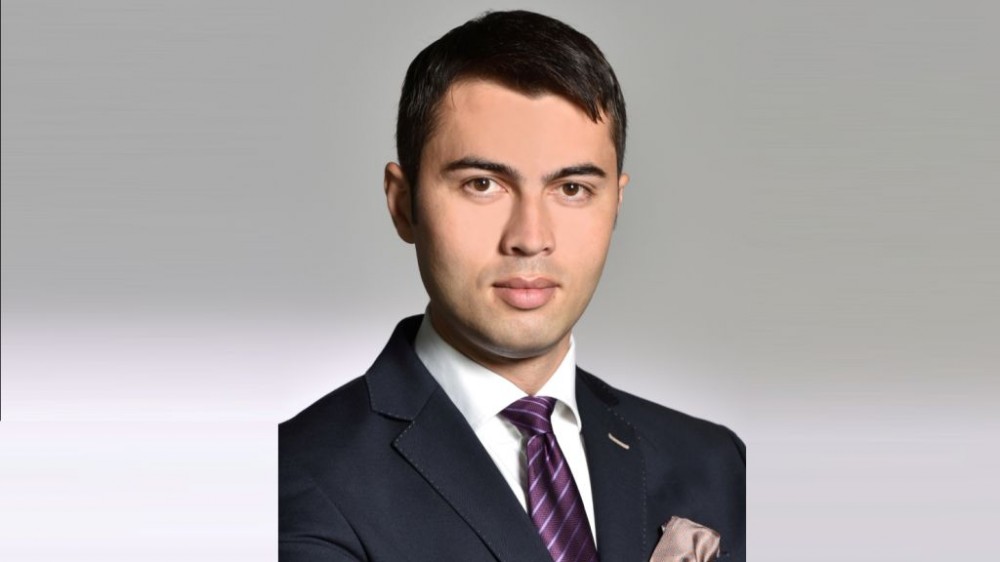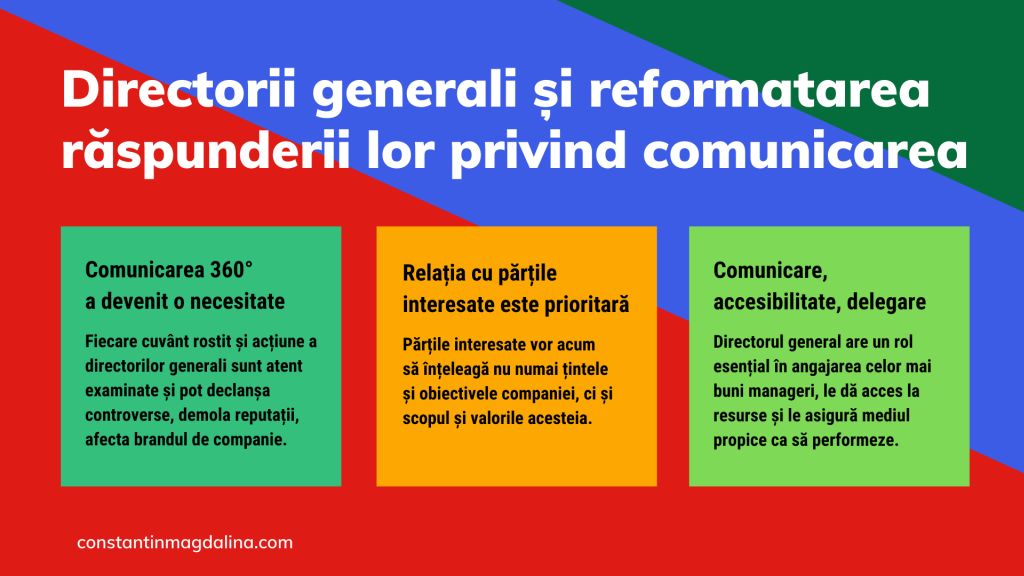
In 2016, I conducted research among the employees of Romanian companies regarding the presence of general managers in social media. At the time, the seemingly optimistic result of 63% social media presence hid the truth that only 44% of managers and 46% of staff knew about the presence of their bosses on social media. How many customers knew that?
The need for top-down communication has increased
What was not an emergency then is now. I do not urge CEOs to take social media by storm. They have many other things to do. I am talking about the 360 ° communication of the leaders who no longer only bear the responsibility of the employees and the results of their company, but are called by the pandemic situation to express themselves about the community, in which the company they lead carries out its operations.
Impact of CEO communication
Why are these issues more important now? Because the pandemic forced top managers to manage the impact of the economy shut down, supply chain volatility, the relationship with employees, domestic policies adapted to working from home, etc. In other words, urged by the context the general managers had send messages, direction, and confidence to all stakeholders, obviously worried about the impact of the decisions on their future.
360 ° communication has become a necessity
The general managers exceeded the level of reporting the results only to the shareholders, and somewhere there, discreetly, and of sending the internal communication messages to the employees. Today they need to communicate to a range of stakeholders, from shareholders to customers and employees, from suppliers to regulators and the community. On social networks, executives are now held accountable in as public a way as possible manner. Every word and action they take is carefully examined and has the potential to spark controversy, demolish reputations, affect the company brand.
The relationship with stakeholders is a priority
Stakeholders now want to understand not only the company's goals and objectives but also its purpose and values. When social or regulatory issues arise, companies are expected and even pressured, to talk about how they conflict with their mission.
The expansion of the public arena in the online environment has also expanded the concept of business affairs. Now, companies are considering issues such as data security, mental health, and work-life balance, diversity, regulation, compliance, or customer relations.
It is the responsibility of the Director-General to find out how to effectively navigate this new reality, keeping a distributive focus on short-term profitability and long-term sustainability initiatives.
Communication, accessibility, delegation
Delegation is a new dimension that changes in the act of leadership. Managing a hierarchy-based management system, general managers were accustomed to employees passing their proposals through a chain of command for approval and eventually receiving access to leadership roles.
The pandemic gives relevance to a trend that is gaining more and more ground: the leader as a facilitator for employee performance. In other words, it has a clear role in hiring the best professionals, gives them access to resources and provides them with the right environment for them to perform, then takes a step back and lets them manage initiatives, projects, teams, departments.
In this way, the general manager empowers his managers to initiate an idea, solve a problem or form a team without waiting for his opinion or permission. In addition, this approach facilitates innovation, which is a priority for many CEOs.
The link of change is communication
As we talked about the change in terms of the CEO's responsibilities for managing change, the link is communication. I am certainly not talking here about formal communication, a plastic language that misses precisely the clarity it aims for. Nor I am talking about communication that suspends concrete action to solve operational challenges.
I talk about authentic communication, full of empathy, motivation, recognition of difficulties, feedback, and feedforward. That is communication that shapes the desired changes and continuously strengthens their impact on the company. And here, the central role is played by the general manager.
Frequent communication about what the company does to ensure the financial and health security of employees, about the business prospects, and about the changes and market opportunities that need to be addressed, belongs to the general manager.
In conclusion
It is not at all easy to be in the shoes of a general manager at this time. Assuming the position of effective leader for shareholders, the leader who gives direction and purpose to employees to unleash their collective energy, concerned with community issues, in response to the latest regulations in the field but also to social injustices, is itself very complicated. The chaos is dispelled by clarity and it has become clear that CEOs need to adapt the way they develop their strategies, run their companies, and communicate their roles and responsibilities within and outside the organization.
About Constantin Magdalina
Constantin Magdalina has 10 years of working experience, while he performed in multinationals both in Romania and abroad. Constantin has a master’s degree in Marketing and Business Communication from the Academy of Economic Studies Bucharest. He is certified in Lean Six Sigma and ITIL which provide him a good understanding of processes and transformations within organizations. The Chartered Institute of Marketing certification furthered complemented his expertise and knowledge in business. In those over 4 years of working activity in a Big4 company, he initiated and conducted studies that analyzed different aspects related to the business environment in Romania such as the economic growth predictions of companies in 2013-2016, knowledge management, the buying experience in the age of digital consumers, social media 2013-2015, the utilization of mobile devices in Romania. He is the author of numerous articles on topics related to innovation, the efficiency of business processes, social media, the consumers’ buying experience in the age of digital, trends, and emergent technologies. He is invited as a speaker at numerous events and business conferences.

































